5 start with E start with E
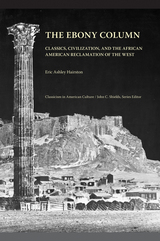
That omission, Hairston contends, is disturbing not least because of its longevity— from an early period of overt stereotyping and institutionalized racism right up to the contemporary and, one would hope, more cosmopolitan and enlightened era. Challenging and correcting that persistent shortsightedness, Hairston examines several prominent black writers’ and scholars’ deep investment in the classics as individuals, as well as the broader cultural investment in the classics and the values of the ancient world. Beginning with the late-eighteenth-century verse of Phillis Wheatley, whose classically inspired poems functioned as a kind of Trojan horse to defeat white oppression, Hairston goes on to consider the oratory of Frederick Douglass, whose rhetoric and ideas of virtue were much influenced by Cicero, and the writings of educator Anna Julia Cooper, whose classical training was a key source of her vibrant feminism. Finally, he offers a fresh examination of W. E. B. DuBois’s seminal The Souls of Black Folk (1903) and its debt to antiquity, which volumes of commentary have largely overlooked.
The first book to appear in a new series, Classicism in American Culture, The Ebony Column passionately demonstrates how the myths, cultures, and ideals of antiquity helped African Americans reconceptualize their role in a Euro-American world determined to make them mere economic commodities and emblems of moral and intellectual decay. To figures such as Wheatley, Douglass, Cooper, and DuBois, classical literature offered striking moral, intellectual, and philosophical alternatives to a viciously exclusionary vision of humanity, Africanity, the life of the citizen, and the life of the mind.
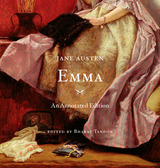
Emma, perhaps the most technically accomplished of all of Austen’s novels, is also, after Pride and Prejudice, her most popular one. Its numerous film and television adaptations testify to the world’s enduring affection for the headstrong, often misguided Emma Woodhouse and her many romantic schemes. Like the previous volumes in Harvard’s celebrated annotated Austen series, Emma: An Annotated Edition is a beautiful and illuminating gift edition that will be treasured by readers.
Stimulating and helpful annotations appear in the book’s margins, offering information, definitions, and commentary. In his Introduction, Bharat Tandon suggests several ways to approach the novel, enabling a larger appreciation of its central concerns and accomplishments. Appearing throughout the book are many illustrations, often in color, which help the reader to better picture the Regency-era world that serves as the stage for Emma’s matchmaking adventures.
Whether explaining the intricacies of early nineteenth-century dinner etiquette or speculating on Highbury’s deliberately imprecise geographical location, Tandon serves as a delightful and entertaining guide. For those coming to the novel for the first time or those returning to it, Emma: An Annotated Edition offers a valuable portal to Austen’s world.
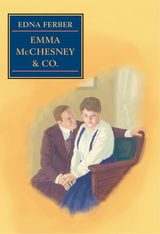
In this final of three volumes chronicling the travels and trials of Emma McChesney, first published in 1915, Emma's son, Jock, has moved to Chicago with his new wife. Struggling with a newly emptied nest, Emma dives into a whirlwind South American sales tour to prove she hasn't lost her touch.
Back in New York, Emma and her business partner, T. A. Buck Jr., try to disguise their budding romance from colleagues. After months of acting like a "captain of finance when he feels like a Romeo," T. A. convinces Emma they should marry. Emma tries to "be what the yellow novels call a doll-wife" but trades in her fancy dressing gowns for more sensible business suits and heads back to the office.
With one hand writing advertising copy and the other wrapped around a pair of shears, Emma saves the company from financial peril amid the arrival of some flustering, if exciting, news from Jock. By turns sales pro, newlywed, fashion maven, and anxious grandmother, Emma symbolizes the ideal woman at the dawn of the twentieth century: sharp, capable, charming, and progressive. Emma McChesney and Co. is enhanced by the illustrations of James Montgomery Flagg, one of the most highly regarded book illustrators of the period.
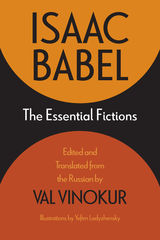
Babel was born in 1894 into multicultural Odessa’s thriving Jewish community. Working as a journalist, he witnessed the Bolshevik Revolution and Civil War, and accompanied the Cossack horsemen of the Red Cavalry during the 1920 Polish-Soviet War, distilling these experiences into his fiction. Vinokur highlights Babel’s “horrified hopefulness” and “doleful and bespectacled Jewish comedy” in the face of the bloody conflicts that plagued his generation.
On the centenary of the revolution that toppled the Romanov tsars, Babel’s fictions continue to absorb and fascinate contemporary readers interested in eastern European and Jewish literature as well as the history and politics of the twentieth century.
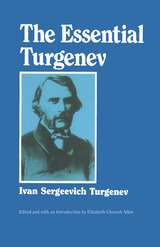
Readers will find complete, exemplary translations of Turgenev's finest novels, Rudin, A Nest of Gentry, and Fathers and Sons, along with the lapidary novella First Love. The volume also includes selections from Sportsman's Sketches, seven of Turgenev's most compelling short stories, and fifteen prose poems. It also contains samples of the author's nonfiction drawn from autobiographical sketches, memoirs, public speeches, plus the influential essay "Hamlet and Don Quixote" and correspondence with Dostoevsky, Tolstoy, and others.
READERS
Browse our collection.
PUBLISHERS
See BiblioVault's publisher services.
STUDENT SERVICES
Files for college accessibility offices.
UChicago Accessibility Resources
home | accessibility | search | about | contact us
BiblioVault ® 2001 - 2024
The University of Chicago Press









